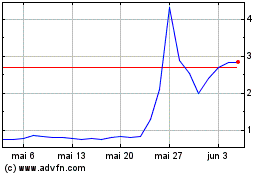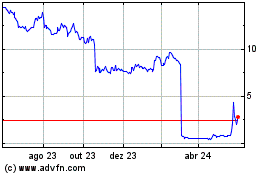Vivoryon Therapeutics N.V. Shares Highlights from Virtual R&D Event with Key Opinion Leaders
17 Outubro 2023 - 10:32AM

Vivoryon Therapeutics N.V. Shares Highlights from Virtual R&D
Event with Key Opinion Leaders
Vivoryon Therapeutics N.V. Shares
Highlights from Virtual R&D Event with Key Opinion
Leaders
- Multiple KOLs highlight
varoglutamstat pathology, clinical development and clinical
applicability of key endpoints in VIVIAD study
- VIVIAD progressing as planned with
final results expected Q1/2024
Halle (Saale) / Munich, Germany, October
17, 2023 – Vivoryon Therapeutics N.V. (Euronext Amsterdam:
VVY; NL00150002Q7) (Vivoryon), a clinical stage
company focused on the discovery and development of small molecule
medicines to modulate the activity and stability of pathologically
altered proteins, today announced key takeaways from its virtual
R&D Event with Key Opinion Leaders (KOLs), focusing on the
Company’s lead program, varoglutamstat, and VIVIAD, a
state-of-the-art Phase 2b study being conducted in Europe and
designed to evaluate its safety, tolerability, and efficacy in 259
(final number of randomized participants) subjects with mild
cognitive impairment (MCI) and mild Alzheimer’s disease (AD).
The event, which was moderated by Philip
Scheltens, M.D., Ph.D., EQT Life Sciences Dementia Fund, featured
presentations from Stephan Schilling, Ph.D., Fraunhofer Institute
for Cell Therapy and Immunology, John Harrison, Ph.D., Scottish
Brain Sciences, Sietske Sikkes, Ph.D., Alzheimer Center at
Amsterdam UMC, Willem de Haan, M.D., Ph.D., Alzheimer Center at
Amsterdam UMC, and Vivoryon Chief Executive Officer (CEO), Frank
Weber, M.D.
“We are pleased to have hosted so many renowned
KOLs as we discussed multiple important facets of varoglutamstat’s
clinical development, its pathology and the clinical utility of
primary and secondary endpoints of the VIVIAD study. We have taken
a meticulous and well thought out approach to the VIVIAD trial
design and believe that the primary endpoint, Cogstate NTB
(neurological test battery), represents the top standard in
assessing cognition,” said Frank Weber, M.D., CEO of Vivoryon.
“While significant advancements have been made for AD patients, we
believe that varoglutamstat has the potential to address vast unmet
need by providing patients with an easy to administer, oral small
molecule. We look forward to the final readout of VIVIAD in the
first quarter of next year.“
Highlights from Dr. Schilling’s presentation
include:
-
Pyroglutamate-modified Abeta (N3pE-Abeta) is a trigger of toxicity
in AD and there is a strong rationale for targeting N3pE-Abeta to
create a tailored AD therapy.
- Experimental
data show that N3pE-Abeta has very different physio-chemical
properties compared to other Abeta variants, including its
potential to form highly toxic oligomers and fibrils together with
non-modified Abeta variants.
- Strong
pre-clinical evidence supports the hypothesis that reducing
N3pE-Abeta formation by inhibiting the enzyme QPCT, has the
potential to change the course of progression of AD.
Highlights from Dr. Harrison’s presentation
include:
- AD is a
disorder of cognition, not just memory and MCI and early AD are
characterized by a variety of cognitive deficits.
- The Cogstate
NTB, which is used to assess the effect of varoglutamstat on
cognition in the primary and secondary endpoints in the VIVIAD
study, is a sensitive and well-established scale in the field of AD
research. It has the advantage of investigating a broad range of
cognitive domains acknowledged to be clinically meaningful measures
of function.
- A preliminary
blinded data analysis (cut-off May 2023) conducted for the Data
Safety Monitoring Board (DSMB) showed that the trajectory of the
Cogstate Brief Battery (CBB, which includes Identification,
Detection, One Back, and One Card Learning of the NTB) in VIVIAD
displayed a ~28% change from baseline (n= >250 patients)
compared to the end of treatment (week 96 or early discontinuation
of treatment; n=36 patients at data cut-off).
- Within this
preliminary blinded analysis, the four individual test components
of the CBB (Identification, Detection, One Back, One Card Learning)
displayed declines that varied in trajectories, supporting the
concept that patients with early AD have variable progression rates
for individual memory functions. While these preliminary data
support the selection of the Cogstate NTB as primary and key
secondary endpoints in VIVIAD to assess the effect of
varoglutamstat on cognition, it is important to note that no
assessment of the efficacy of varoglutamstat can be derived from
this preliminary and blinded dataset.
Highlights from Dr. Sikkes’ presentation
include:
- The Amsterdam
IADL Questionnaire (A-IADL-Q) is applied in the VIVIAD study as a
key secondary endpoint to assess the effect of varoglutamstat on
the instrumental activities of daily living.
- The scale has
been specifically developed and validated for patients with AD and
incorporates the input of caregivers and clinicians, supporting its
clinical meaningfulness.
- The A-IADL-Q is
validated across several cultures, including the U.S. as well as
the Western European countries in which the VIVIAD study is
conducted.
- The A-IADL-Q
contains relevant activities that matter to patients, caregivers
and health care professionals.
- The high
psychometric quality, i.e. reliability and validity, support its
use as an outcome measure in treatment evaluation studies and for
use in clinical practice.
Highlights from Dr. de Haan’s presentation
include:
- EEG is a
relatively direct, large-scale tool to capture neuronal and
synaptic function. Normalization of EEG parameters (theta power,
connectivity) is presumed to be beneficial for brain function in
AD.
- The SAPHIR
Phase 2a study of varoglutamstat has shown an improvement of theta
power and connectivity.
- Based on the
results in the SAPHIR study in early AD patients, theta power has
been selected as a key secondary endpoint in the VIVIAD study.
Other oscillatory, connectivity and network analysis will be
conducted as exploratory analysis in the VIVIAD trial.
Highlights from Dr. Weber’s presentation
include:
- An overview of
varoglutamstat’s clinical development was provided, including a
thorough discussion of study design and expectations for the first
quarter 2024 data readout.
- In 2022, the
DSMB decided that the VIVIAD study should be continued with the
600mg twice daily dose based on an analysis of safety and
tolerability of 90 patients randomized 1:1:1 between placebo, 300mg
and 600mg varoglutamstat twice daily and followed for at least 24
weeks post randomization.
- Vivoryon
expects the final VIVIAD dataset to include an evaluation of
patients following the 12-week titration period, which is the same
for every patient randomized to the active arm. The 600mg twice
daily dose is applied in approximately 75% of the treatment weeks
of all patients and the 300mg twice daily dose is applied in
approximately 25% of the treatment weeks.
- The study
protocol defines a duration of treatment of 48 weeks minimum and 96
weeks maximum per patient dependent on when the patient was
randomized into the study.
- A preliminary
analysis of the blinded data shows that the expected average
treatment duration in the VIVIAD study is more than 80 weeks with
more than 60% of patients treated for 84 and 96 weeks,
approximately 30% for 60 and 72 weeks, and less than 10% for 48
weeks.
- All data
presented to-date are blinded and preliminary with the study still
ongoing.
A Webcast of the virtual R&D Event will be
available via the "Presentations & Webcasts" page in the
Investor Relations section on the Company's website at
www.vivoryon.com.
###
About Vivoryon Therapeutics
N.V.Vivoryon is a clinical stage biotechnology company
focused on developing innovative small molecule-based medicines.
Driven by our passion for ground-breaking science and innovation,
we strive to change the lives of patients in need suffering from
severe diseases. We leverage our in-depth expertise in
understanding post-translational modifications to develop medicines
that modulate the activity and stability of proteins which are
altered in disease settings. Beyond our lead program,
varoglutamstat, which is in Phase 2 clinical development to treat
Alzheimer’s disease, we have established a solid pipeline of orally
available small molecule inhibitors for various indications
including cancer, inflammatory diseases and fibrosis.
www.vivoryon.com
Varoglutamstat Disclaimer for R&D
EventVaroglutamstat is not an approved medicine, the
product is under development for the treatment of early AD. All
data presented on the VIVIAD study to date are blinded and
preliminary, the study is still ongoing with final readout expected
in the first quarter of 2024. The data from the VIVIAD study
presented to date shall not and cannot be interpreted in respect to
whether varoglutamstat is safe or effective. The data from the
VIVIAD study presented to date shall not and cannot be interpreted
with respect to the final results and the outcome of the VIVIAD
study.
Vivoryon Forward Looking
StatementsThis press release includes forward-looking
statements, including, without limitation, those regarding the
business strategy, management plans and objectives for future
operations of the Vivoryon Therapeutics N.V. (the “Company”),
estimates and projections with respect to the market for the
Company’s products and forecasts and statements as to when the
Company’s products may be available. Words such as “anticipate,”
“believe,” “estimate,” “expect,” “forecast,” “intend,” “may,”
“plan,” “project,” “predict,” “should” and “will” and similar
expressions as they relate to the Company are intended to identify
such forward-looking statements. These forward-looking statements
are not guarantees of future performance; rather they are based on
the Management’s current expectations and assumptions about future
events and trends, the economy and other future conditions. The
forward-looking statements involve a number of known and unknown
risks and uncertainties. These risks and uncertainties and other
factors could materially adversely affect the outcome and financial
effects of the plans and events described herein. Actual results,
performance or events may differ materially from those expressed or
implied in such forward-looking statements and from expectations.
As a result, no undue reliance should be placed on such
forward-looking statements. This press release does not contain
risk factors. Certain risk factors that may affect the Company’s
future financial results are discussed in the published annual
financial statements of the Company. This press release, including
any forward-looking statements, speaks only as of the date of this
press release. The Company does not assume any obligation to update
any information or forward-looking statements contained herein,
save for any information required to be disclosed by law.
For more information, please contact:
Investor ContactStern IRJulie SeidelTel: +1
212-698-8684Email: julie.seidel@sternir.com
Media ContactTrophic CommunicationsValeria
FisherTel: +49 175 8041816Email: vivoryon@trophic.eu
- 231017_VVY_RD Event Highlights
Vivoryon Therapeut (EU:VVY)
Gráfico Histórico do Ativo
De Nov 2024 até Dez 2024

Vivoryon Therapeut (EU:VVY)
Gráfico Histórico do Ativo
De Dez 2023 até Dez 2024
